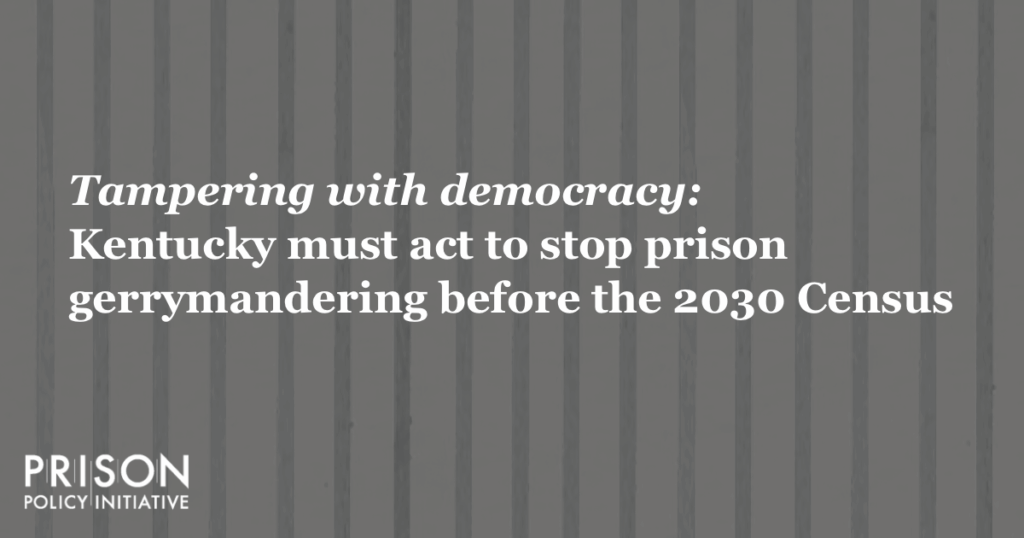Kentucky’s democracy is once again under strain. Following the 2020 Census, redistricting data was skewed due to a federal Census policy that counts incarcerated people where they are imprisoned rather than in their home communities. This practice—known as prison gerrymandering—distorts political representation, siphons power away from urban and minority communities, and inflates the political influence of districts where prisons are located.
While advocates have long argued that the policy undermines the principle of “one person, one vote,” state lawmakers have the power to fix the problem before the 2030 Census. At the same time, the issue of prison gerrymandering intersects with another deeply troubling reality: the rise of for-profit prison corporations whose bottom lines depend on keeping incarceration and detention rates high. Together, these forces create a cycle that harms democracy, human rights, and social justice.
For advocates of climate justice, racial justice, and social equity, these structural failures demand urgent reform. Learn more about how systemic change and accountability are connected to climate justice here.
Kentucky’s Skewed Democracy: Prison Gerrymandering
When incarcerated people are counted in prison districts rather than in their home communities, political representation is shifted unfairly. In Kentucky, this policy inflates the voting power of predominantly rural districts—where large prisons are located—while diminishing the representation of urban communities, which are often home to the families of those incarcerated.
The result is a distorted political map that does not reflect the true population distribution of the state. Critics call this a “democracy gap,” where residents in certain communities are effectively silenced, while others benefit from disproportionate political clout simply because they house a prison.
Kentucky is not alone. Across the United States, the Census Bureau’s approach to counting incarcerated populations has long been criticized for undermining fair representation. Unless states act independently to adjust their redistricting data—as some already have—these distortions will persist into 2030 and beyond.
The Profit Engine of Private Prisons
Layered onto this democratic imbalance is the reality that incarceration itself has become a profit-driven industry. Major private prison corporations, such as The GEO Group (NYSE: GEO) and CoreCivic (NYSE: CXW), are publicly traded on Wall Street. Their revenue and stock performance depend directly on inmate and detainee occupancy rates, which are often tied to government contracts that guarantee a minimum number of filled beds.
How They Profit:
- Government contracts: State, local, and federal agencies—such as Immigration and Customs Enforcement (ICE)—contract with private prison companies, locking in revenue streams. Many of these contracts include “bed guarantees,” ensuring profits regardless of crime rates or actual need.
- Immigration detention: Shifts in immigration policy drive industry growth. For example, after the 2024 presidential election, analysts projected growth in detention demand, causing prison stock prices to surge.
- Federal funding: The 2025 federal budget allocated a staggering $45 billion to grow ICE’s detention network, creating massive financial opportunities for private prison operators.
This system transforms incarceration and detention from a matter of justice into a market commodity—one where more prisoners mean more profit.
Risks, Abuses, and Ethical Failures
The private prison model has been widely condemned for its ethical, social, and financial risks:
- Human rights abuses: Private facilities, particularly immigrant detention centers, have been linked to unsafe conditions, inadequate medical care, and widespread reports of neglect and abuse. Family separations at the border remain one of the most shocking examples.
- Perverse incentives: By tying financial performance to occupancy rates, the system encourages policies that keep incarceration and detention numbers high rather than investing in alternatives like rehabilitation or community support.
- Investor backlash: Environmental, Social, and Governance (ESG) investors increasingly reject prison profiteering as incompatible with sustainable and ethical portfolios. Major banks such as Wells Fargo and JPMorgan Chase have already withdrawn financing.
- Political volatility: Policy changes create financial uncertainty. President Biden’s directive for the Department of Justice to end private prison contracts with federal agencies highlighted the industry’s dependence on political winds. Future administrations could reverse or expand these policies, causing market instability.
At its core, profiting from incarceration undermines not only human rights but also democratic systems, as policies may be shaped more by shareholder interests than by the needs of society.
Linking Census Policy and Private Prisons
When combined, the issues of prison gerrymandering and private prison profiteering reveal a troubling cycle:
- Incarcerated individuals are counted in the districts of the prisons where they are confined, bolstering political power in those areas.
- Many of those prisons are operated by for-profit corporations that benefit financially from higher incarceration rates.
- This distorted representation can, in turn, influence lawmakers to maintain policies that sustain prison populations—whether through punitive sentencing, immigration enforcement, or resistance to reform.
The result is a feedback loop where democracy is distorted and incarceration is incentivized—both of which perpetuate inequality and injustice.
A Call to Action
Kentucky lawmakers—and policymakers across the nation—have an opportunity to break this cycle. Solutions include:
- Ending prison gerrymandering by counting incarcerated people in their home communities for redistricting purposes.
- Phasing out private prison contracts and shifting toward publicly accountable facilities.
- Investing in alternatives to incarceration, such as rehabilitation, education, and restorative justice programs.
- Ensuring transparency and oversight in all detention and incarceration systems.
- Integrating social justice with climate justice, recognizing that systemic exploitation—whether of people or the planet—is rooted in similar patterns of profit-driven neglect.
Conclusion: Fixing Kentucky’s Democracy and Beyond
Kentucky’s democracy, like much of America’s, is weakened by policies and industries that prioritize profit and political advantage over fairness and justice. Prison gerrymandering distorts representation, while private prisons turn incarceration into a commodity. Together, they create a system that is not only unjust but unsustainable.
As we look toward 2030 and beyond, real reform must tackle both issues head-on. Ensuring fair redistricting, rejecting profit-driven incarceration, and advancing policies rooted in equity and sustainability are essential steps toward repairing democracy.
For ongoing reporting on how systemic injustice intersects with climate, democracy, and human rights, visit Sustainable Action Now’s climate section


